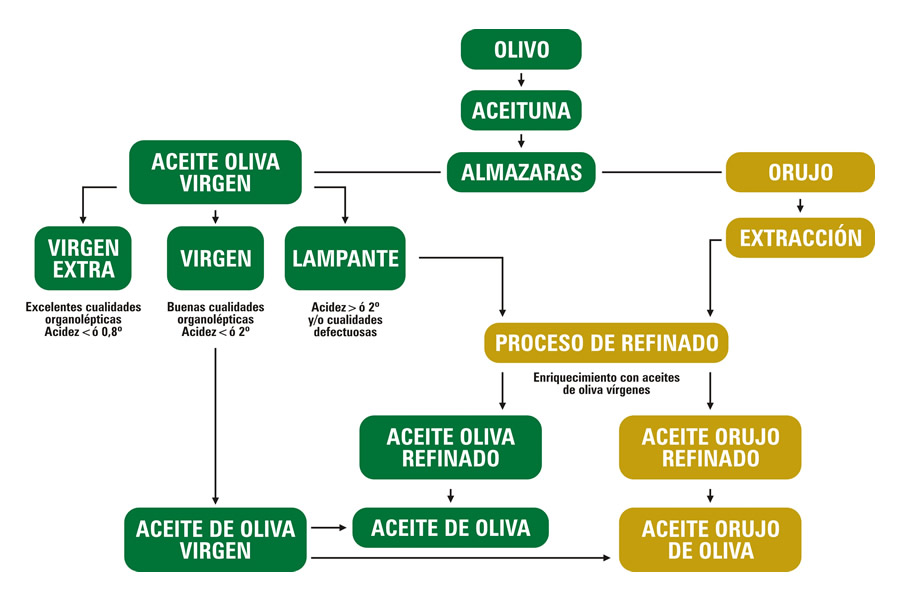Olive oil. Proper name. Indicates that it is an oil whose origin is the
Virgin olive. First surname. Indicates natural juice.
Making an analogy with the process of obtaining orange juice, we will see the different qualities of virgin olive oils that are obtained depending on some variants of the said process.
- Extra Natural Orange Juice and
- Olive Oil ( olive origin ) Virgin (natural juice) Extra (highest quality)

Let us suppose, now, that the oranges have been harvested for several days and stored in the refrigerator. The juice we obtain will be a little different, more “dull”. It still reminds us of the oranges from which it comes, but its organoleptic characteristics, smell and taste, are less intense. Its nutritional value remains the same as that obtained from freshly harvested oranges and we should not be afraid of consuming it (making ourselves ill) because it is still of maximum food safety. We can define it as Natural Orange Juice but not of the highest quality.
Let’s think the same with olives… The juice obtained is not extra, its name is Virgin Olive Oil , it loses the second surname (extra):
- Olive oil . Proper name. Indicates that it is an oil whose origin is the olive.
- Virgin . First surname. Indicates natural juice
What would happen if I accidentally left the oranges out of the fridge for a few days? – What a stupid question, Rosa – They would start to rot. What if I made juice from them? – How disgusting! – I would end up with a juice with a flavour and smell that “does not” remind us, at all, of the oranges from which they come; it reminds us of “rotten”. It is the worst quality natural orange juice that can be obtained.
Let’s think about olives again. If the olives are not healthy, just like natural orange juice, we get a juice that reminds us of the fermentation processes (rotten) that it has undergone. Its name is Lampante Virgin Olive Oil , and it takes on a second surname again:
- Olive oil . Proper name. Indicates that it is an oil whose origin is the olive.
- Virgin . First surname. Indicates natural juice
- Lampante . Second surname. Indicates poorer quality.
The term lampante comes from ancient times, when there was no electric light and oil lamps were used for lighting. The intelligent oil producers of the time ate the oils that smelled and tasted good, and used those with an “unpleasant” smell and taste in lamps.
It is curious to observe the number of terms that, in the world of olive oils, are carried along by tradition even though they have fallen into disuse in popular terms.
If by chance (which I am not saying happens) we are a bit “dirty” and, even though the fruit is healthy and freshly picked, some of the utensils we use are dirty, the natural juice we obtain smells and tastes like the “garbage” it has been through, being of poor quality. I must point out that “virgin olive oils” behave like sponges that absorb all the smells they pass through.
Well, after all this talk, I hope that you now understand that three qualities of natural juice can be obtained directly from olives, generally called “Virgin Olive Oils” , each with a common name and different surnames.
Summary from a consumer point of view:
- Extra Virgin Olive Oil . Natural olive juice of the highest quality. It is characterized by an intense smell and flavor reminiscent of the olive from which it comes. It has a high nutritional and health value.
- Virgin Olive Oil . Natural olive juice. It has less smell and taste, but it still has a high nutritional and health value.
- Lampante Virgin Olive Oil . Natural olive juice that smells and tastes bad. It cannot be consumed.
